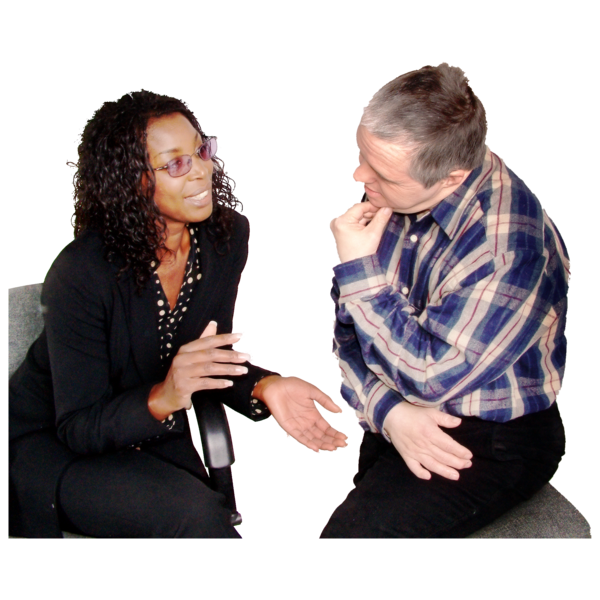Jan Tregelles, chief executive of Mencap and Vivien Cooper, chief executive of The
Challenging Behaviour
 Challenging behaviour can be when someone hurts themselves, hits or pinches someone else, or breaks something. Some people might behave like this because they are upset or because people do not understand them.
Foundation, respond to the CQC’s Monitoring the Mental Health Act 2012/13 report:
Challenging behaviour can be when someone hurts themselves, hits or pinches someone else, or breaks something. Some people might behave like this because they are upset or because people do not understand them.
Foundation, respond to the CQC’s Monitoring the Mental Health Act 2012/13 report:
It is clear from the CQC report that urgent change is needed to ensure people detained or treated under the Mental Health Act (MHA) get the least restrictive care possible, and that the use of restraint and seclusion is kept to a minimum. We are deeply worried that despite this being required by the law
Laws are the rules that everyone in the country has to follow. If you don't follow the rules you can get in trouble with the police. , it is not happening in practice.
The report contains some shocking examples of the use of restraint and seclusion in units for people with a learning disability
A learning disability is to do with the way someone's brain works. It makes it harder for someone to learn, understand or do things. . Two and a half years after the scandal at Winterbourne View, where people with a learning disability were victims of abuse and inappropriate use of restraint, it is unacceptable that not enough has changed.
We welcome the CQC’s commitment to making sure everyone detained under the MHA is supported using person centred approaches and cared for in the least restrictive way possible. To make this a reality for people with a learning disability, commissioners, providers, health and social care
Social care means the services that give care and support to people who need it. professionals and the CQC will need to focus on the specific needs of this particularly vulnerable group of people who often can’t speak up for themselves.
People with a learning disability who display behaviour that challenges must be treated with dignity and respect and their needs understood. It is crucial that the support they receive is underpinned by the principles of positive behaviour support and that barriers to accessing independent advocacy
Advocacy is when you get support to have your say. and legal representation are removed.
-ENDS-
Notes to editors
For further information or to arrange interviews, please contact the Mencap press office on 020 7696 6950 or media@mencap.org.uk.
About Mencap
There are 1.4 million people with a learning disability in the UK. Mencap works to support people with a learning disability, their families and carers by fighting to change laws, improve services and access to
education
 Education is when you learn things. When you fill in a form to get a job, education means you write where you went to school, college or university.
,
employment
Education is when you learn things. When you fill in a form to get a job, education means you write where you went to school, college or university.
,
employment
 Employment means having a job.
and
leisure
Employment means having a job.
and
leisure
 Leisure is when you have time to do things you enjoy like playing sports or going to the pub.
facilities. Mencap supports thousands of people with a learning disability to live their lives the way they want.
Leisure is when you have time to do things you enjoy like playing sports or going to the pub.
facilities. Mencap supports thousands of people with a learning disability to live their lives the way they want.
For advice and information about learning disability and Mencap services in your area, contact Mencap Direct on 0808 808 1111 (9am-5pm, Monday-Friday) or email help@mencap.org.uk.
Mencap is a member of the Mental Health Alliance
The Mental Health Alliance is a coalition of 75 organisations from across the mental health spectrum and beyond, which is working together to
advocate
 An advocate is a person who can help you have your say. An advocate can speak up for you if you find it hard.
for fair implementation of the Mental Health Act in England and Wales.
An advocate is a person who can help you have your say. An advocate can speak up for you if you find it hard.
for fair implementation of the Mental Health Act in England and Wales.
About The Challenging Behaviour Foundation
The Challenging Behaviour Foundation provides information, support and training around challenging behaviour associated with severe learning disabilities, and leads the ‘Challenging Behaviour National
Strategy
 A strategy is a plan to show what an organisation, or a person, wants to do and how they are going to do it.
Group’ which seeks to influence policy and practice nationally on behalf of individuals who challenge and their families.
A strategy is a plan to show what an organisation, or a person, wants to do and how they are going to do it.
Group’ which seeks to influence policy and practice nationally on behalf of individuals who challenge and their families.
The Challenging Behaviour Foundation was founded in 1997 by Vivien Cooper, parent of a son with severe learning disabilities and behaviour described as challenging. Today the Challenging Behaviour Foundation is in regular contact with over 5000 families and professionals across the UK. There are an estimated 30,000 individuals in England with severe learning disabilities and behaviour described as challenging.